Modern Foreign Languages
Welcome
At Balcarras School, the Modern Foreign Languages (MFL) department is committed to fostering a passion for language learning and promoting an understanding of diverse cultures. We believe that language acquisition is key to unlocking global opportunities, enhancing cognitive skills, and nurturing tolerance and empathy among our students.
Our MFL curriculum is designed to:
- Inspire a love of languages and the cultures they represent.
- Empower students with the linguistic skills to communicate effectively in a global context.
- Promote cognitive and social development through language learning, enhancing literacy and problem-solving skills.
- Develop confident and independent learners who are equipped for success in future careers, further studies, and global citizenship.
MFL and the whole school curriculum
Our MfL curriculum aims to
-
be broad and balanced
-
be relevant to students and to help them develop essential linguistic and cultural knowledge and skills regardless of gender, ability, ethnicity, or social background
-
ensure equal access to learning for all pupils, with high expectations for every pupil and appropriate levels of challenge and support as the MfL curriculum becomes more complex
-
encourage students to enjoy their learning through a variety of activities during lessons and promote a sense of success through their achievements
-
foster literacy skills in each year group
-
support pupils’ social and cultural development through independent research about the countries where the languages on our curriculum are spoken
-
generate a wealth of cross-curricular activities including events (speaker sessions, debate competitions, House Languages competitions...), clubs (Italian, Chinese, …) and trips (France, Spain and Russia) open to all
-
equip pupils with the knowledge and cultural capital to encourage pupils to have a global and more outward thinking view of the world
-
prepare students for the next stage in their lives by encouraging resilience, self-reliance, and an understanding of their responsibility to take ownership of their own learning as their linguistic skills build up
French Learning journey
|
Year 7 |
Vocabulary : be able to talk about yourself, your family and friends, pets and describe your school life. Grammar : to learn the basic of French grammar including gender, articles, adjectival agreement and regular -er verbs conjugation in the present tense + avoir and être. Pupils should also be able to recognise the past tense. Phonics : Pupils are introduced to most common sound patterns in French |
|---|---|
|
Year 8 |
Vocabulary: Talk about free time activities, be able to talk about where you live and talk about holidays. Grammar: to review what pupils studied in Year 7 and add modal verbs, comparative forms, preposition and negative forms. Pupils should also be able to recognise the future tense. Phonics: Pupils are reviewing the sound patterns studied in Year 7 and exposed to new ones. |
|
Year 9 |
Vocabulary: Talk about relationships, festival, the medias and school life Grammar: To review what pupils studied in Year 7 and 8, become more confident using three tenses and to use reflexive verbs Phonics: Pupils are introduced to ‘liaison’ : the link between final consonants and vowels which follow. |
|
Year 10
|
Vocabulary: Focus on learning vocabulary for Theme 1 (Identity and culture), Theme 2 (National, international and global areas of Interest) from the AQA specification. Grammar: Revision of verb tenses, adjectival agreement and other grammar points studied in KS3. Adding more complex grammar points such as perfect/imperfect, superlative forms, venir de, object pronouns for example. Exam skills : prepare students for speaking and writing skills. |
|
Year 11
|
Vocabulary: Focus on learning vocabulary for Theme 2 (National, international and global areas of Interest) and Theme 3 (Current and future study and employment) from the AQA specification. Grammar: Revision of verb tenses, adjectival agreement and other grammar points studied in KS3 and Year 10. Adding more complex grammar points such as conditional, using en+ present participle, avant de, subjunctive, passive voice,… for example. Exam skills : prepare students for speaking and writing skills. |
|
Year 12 |
Content: Students study a range of topics based on France and the French-speaking world. They include: Theme 1: Aspects of French-Speaking society : current trends (family/cybersociety and volunteering) Theme 2: Artistic culture in the French-speaking world (heritage, music and cinema) Students also study the film L’auberge espagnole, directed by Cédric Klapisch Grammar: Students review French grammar and gain an in-depth knowledge of more complex grammar. |
|
Year 13
|
Content: Students study a range of topics based on France and the French-speaking world. They include: Theme 3: Aspects of French-Speaking society : current issues (diversity/ marginalised and criminals) Theme 4: Aspects of political life in the French-speaking world (politics, trade union and immigration) Students also study a novel Un sac de billes, by Joseph Joffo Grammar: Students review French grammar and gain an in-depth knowledge of more complex grammar. |
French Curriculum map
|
Autumn 1 |
Autumn 2 |
Spring 1 |
Spring 2 |
Summer 1 |
Summer 2 |
|
|---|---|---|---|---|---|---|
|
Year 7 |
||||||
|
Year 8 |
||||||
|
Year 9 |
||||||
|
Year 10 |
Mock exams |
|||||
|
Year 11 |
Mock exams |
|||||
|
Year 12 |
|
Mock exams |
|
|
||
|
Year 13 |
Political engagement -Diversity
Sac de billes (book study) |
Politics and Immigration -Criminals
Sac de billes (book study) Mock exams |
Politics and Immigration Criminals
Sac de billes (book study) |
Exam prep |
|
Spanish Learning Journey
|
Year 8 |
Vocabulary: be able to talk about yourself, your family and friends, pets and talk about free time activities, the weather and where you live. Grammar: to learn the basics of Spanish grammar including gender, articles, adjectival agreement, and regular verbs conjugation in the present tense + tener and ser. Pupils will also learn to conjugate the near future tense. Phonics: Phonics linked to the Viva Phonics building pack and GCSE sounds matching chart. |
|---|---|
|
Year 9 |
Vocabulary: be able to talk about holidays, food and mealtimes, telling the time, places in touch, daily routine, making plans to go out. Grammar: recap present tense and future tense, learn the preterite tense. Use three tenses together, recap of year 8 grammar. Prepositions of place, stem-changing verbs, infinitive structures. Phonics: Phonics linked to the Viva Phonics building pack and GCSE sounds matching chart. |
|
Year 10
|
Vocabulary: Focus on learning vocabulary for Theme 1 (Identity and culture), Theme 2 (National, international and global areas of Interest) and Theme 3 (Current and future study and employment) from the AQA specification. Grammar: Present tense, preterite tense, imperfect tense, perfect tense, adjectives, infinitive structures, desde hace, direct object pronouns, using different structures to give opinions, the present continuous tense, using para and the infinitive, using ser and estar, using soler + infinitive. Exam skills : prepare students for speaking and writing skills. |
|
Year 11
|
Vocabulary: Focus on learning vocabulary for Theme 1 (Identity and culture), Theme 2 (National, international and global areas of Interest) and Theme 3 (Current and future study and employment) from the AQA specification. Grammar: all from year 10 and se puede/pueden, demonstrative adjectives, the conditional tense, the simple future tense, the passive voice and avoiding it, reflexive verbs, using expressions with the infinitive,, sabes vs conocer, indirect object pronouns, subjunctive with cuando and the future, giving commands, using the pluperfect tense. Exam skills : prepare students for speaking and writing skills. |
|
Year 12 |
Content: Students study a range of topics based on Spain and the Hispanic world. They include: Theme 1: Aspects of Hispanic society: Modern and traditional values, cyberspace and gender equality. Theme 2: Artistic culture in the Hispanic world: Modern day idols, Spanish regional identity, cultural heritage. Students also study the film María llena eres de Gracia, directed by Joshua Marston. Grammar: Students review Spanish grammar and gain an in-depth knowledge of more complex grammar. |
|
Year 13
|
Content: Students study a range of topics based on Spain and the Hispanic world. They include: Theme 3: Multiculturalism in Hispanic society: Immigration, racism, integration. Theme 4: Political life in the Hispanic world: today’s youth, tomorrow’s citizens, monarchies and dictatorships, popular movements Students also study a play: Las bicicletas son para el verano by Fernando Fernán-Gomez Grammar: Students review Spanish grammar and gain an in-depth knowledge of more complex grammar. |
Spanish Curriculum map
|
Autumn 1 |
Autumn 2 |
Spring 1 |
Spring 2 |
Summer 1 |
Summer 2 |
|
|---|---|---|---|---|---|---|
|
Year 8 |
||||||
|
Year 9 |
||||||
|
Year 10 |
||||||
|
Year 11 |
Trial exam |
|||||
|
Year 12 |
|
|
Trial Exam |
|
Completion of outstanding topics Introduction to IRP Spanish Civil War Full mock paper |
|
|
Year 13 |
Trial Exam |
Russian learning journey
|
Year 8 |
Vocabulary: Introduce yourself in Russian, talk about family members and pets and describe where you live. Grammar: To learn how to use pronouns to talk about others. To learn how to use the prepositional case to talk about where things are. To learn how to use adjectives to describe places in town. Phonics: Pupils are introduced to sounds of the handwritten form of the Cyrillic alphabet. |
|---|---|
|
Year 9 |
Vocabulary: Talk about free time activities and food. Grammar: To learn how to conjugate regular verbs in present, past and future tenses. Introduction to the instrumental case to be able to say whom you do something with. Phonics: Pupils are introduced to the printed form of the Cyrillic alphabet to enable them to read a range of texts. |
|
Year 10
|
Vocabulary: Focus on learning vocabulary for Theme 2 (Local area, holiday, travel), Theme 3 (School) and Theme 4 (Future aspirations, study and work) from the Pearson Edexcel specification. Grammar: Revision of verb tenses and an introduction and review of Russian cases (basic use of prepositional, accusative, genitive and instrumental). Adjectival agreement. Exam skills : prepare students for speaking and writing skills. |
|
Year 11
|
Vocabulary: Focus on learning vocabulary for Theme 1 (Identity and culture) and Theme 5 (International and global dimension) from the Pearson Edexcel specification. Grammar: Conjugation of regular and irregular verbs across different tenses. Revision of cases and adjectival agreement. Introduction to complex structures. Exam skills : prepare students for speaking and writing skills. |
|
Year 12 |
Content: Students study a range of topics based on Russia and the Russian-speaking world. They include: Theme 1: The development of Russian society (The life of young Russians, education and work) Theme 2: Culture in the Russian-speaking world (media, mass culture and holidays/festivals) Students also study the film Burnt By The Sun, directed by Nikita Mikhalkov. Grammar: Students review the Russian case system and gain an in-depth knowledge of how cases are used in the language. Students also begin to explore complex grammar such as compound conjunctions and negatives. |
|
Year 13
|
Content: Students study historical and geographical topics based on Russia and the Soviet Union. They include: Theme 3: Moscow (population change, social issues, environment) Theme 4: Final years of the USSR (Perestroika, Glasnost’, 1991) Students also study the short story Queen of Spades, by Pushkin. Grammar: Students review the Russian case system and both regular and irregular verbs. They focus on areas of complex language to develop their level of speaking and writing. This includes participles and verbs of motion. |
Russian curriculum map
|
Autumn 1 |
Autumn 2 |
Spring 1 |
Spring 2 |
Summer 1 |
Summer 2 |
|
|---|---|---|---|---|---|---|
|
Year 8 |
|
|||||
|
Year 9 |
||||||
|
Year 10 |
Year 10 exams |
|||||
|
Year 11 |
MOCK EXAMS |
Speaking Exams |
||||
|
Year 12 |
Theme 1 : Life of young Russians Theme 2: festivals, celebrations
|
|
||||
|
Year 13 |
Yr 13 Mock exam |
|
Language lessons are taught in a purpose built suite of classrooms. Each room is equipped with an interactive whiteboard and all staff use the latest technology and language software in their daily teaching. The department also has a dedicated teaching room with 27 computers, and this has led to the increased use of ICT, particularly web-based, to support language learning.
Key Stage 3
In Year 7 all pupils study French and follow the National Strategy for Language Learning. They learn to speak about themselves, their families and their interests, and how to use the language for real purposes of communication. Year 7 pupils are introduced to the basic language patterns and grammatical features which gives them an understanding of how the language works. They are also taught skills in order to better equip them throughout their language learning experience at Balcarras, such as dictionary skills and pronunciation strategies.
In Year 8 and 9, pupils continue to study French and are also introduced to a second language: either Spanish or Russian. The study of a second language enables pupils to build upon their prior knowledge of French and also to draw on the generic language-learning skills which they have developed in Year 7. We also have other activities going on during the course of the year to encourage pupils in their language learning. Please see photos below.
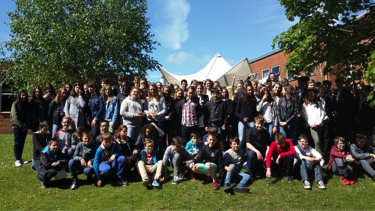
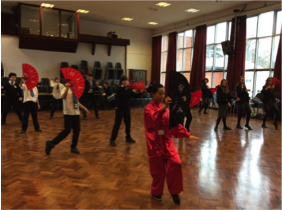
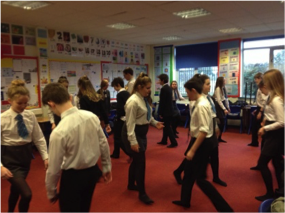
GCSE
At key stage four pupils may choose at least one of these languages to study to GCSE level, but it is not compulsory. However, the vast majority of pupils do opt to take at least one language to GCSE and are advised to do so, particularly if they wish to go on to study at university. Pupils follow the AQA syllabus in French and Spanish and the Edexcel syllabus in Russian. At GCSE level, they are taught to communicate effectively in a variety of situations and to develop and apply their grammatical understanding.
A Level
All three languages are taught to AS and A level and excellent numbers join these courses each year. French and Spanish are taught following the AQA syllabus, while Russian follows the Edexcel syllabus. At this advanced level, pupils are taught to develop their language skills and emphasis is placed on the real world. All AS and A level students spend time working individually with a native language assistant to hone their linguistic abilities and to prepare for the speaking exams. Work experience placements in France and Spain also prove to be popular and have a significant impact on the confidence of the pupils. Residential and/or study visits are also run to all three countries. Our pupils enjoy great success at A level and our department has a strong tradition of students going to study languages at Oxbridge as well as many Russell group universities.
Extracurricular Languages
The department is committed to providing a variety of opportunities for enthusiastic and talented linguists at Balcarras.
We run GCSE Italian after school to pupils in years 9 and 10. This is very popular and has on average 10 students sit the exam every other year. It is a rolling programme, and the course takes 2 years to complete. 100% of candidates in 2024 achieved grades 9-4, 71% of which achieved a grade 7 or higher!
Pupils in key stages 3 & 4 have the opportunity to attend Mandarin Chinese Club. We are fortunate to have the skills of a highly qualified native speaker, whose lessons the pupils greatly enjoy. The club runs on several different days depending on the level. Intermediates have a double session, as they are working towards taking their GCSE. The advanced group just sat their GCSE last summer and 100% of them achieved grades 9-4!
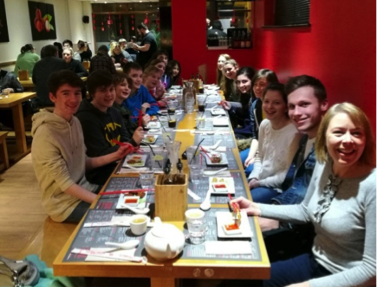
We also run a year 7 French club on Thursday lunchtimes with our foreign language assistant. In these sessions, students learn and practise their French through games and songs. It is a very popular club, and the students say how much they enjoy attending.
The extra-curricular languages we run bring a dynamic element to the MFL department and also help to offer a degree of flexibility to the pupils. Modern foreign languages flourish at Balcarras and we look forward to what the future holds. As languages are a vital part of our ever-changing world, so we look to equip our pupils with the skills which are necessary in order to be successful, in the work environment and also on a social level.
Trips
The department runs a broad range of educational visits for all year groups. These include a four-day residential visit to Normandy for Year 7, a Russian language visit open to all students of Russian, and a homestay and study visit to Málaga for all students of Spanish. Where available, we also run local trips to the literature and film festival. 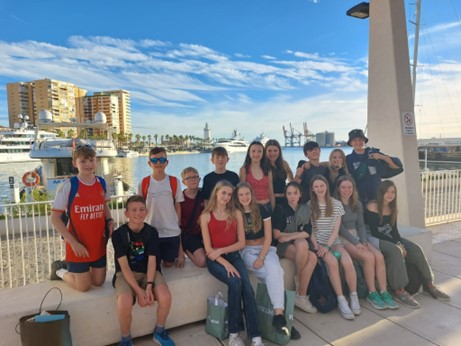
Cultural visit and study to Malaga for students of Spanish
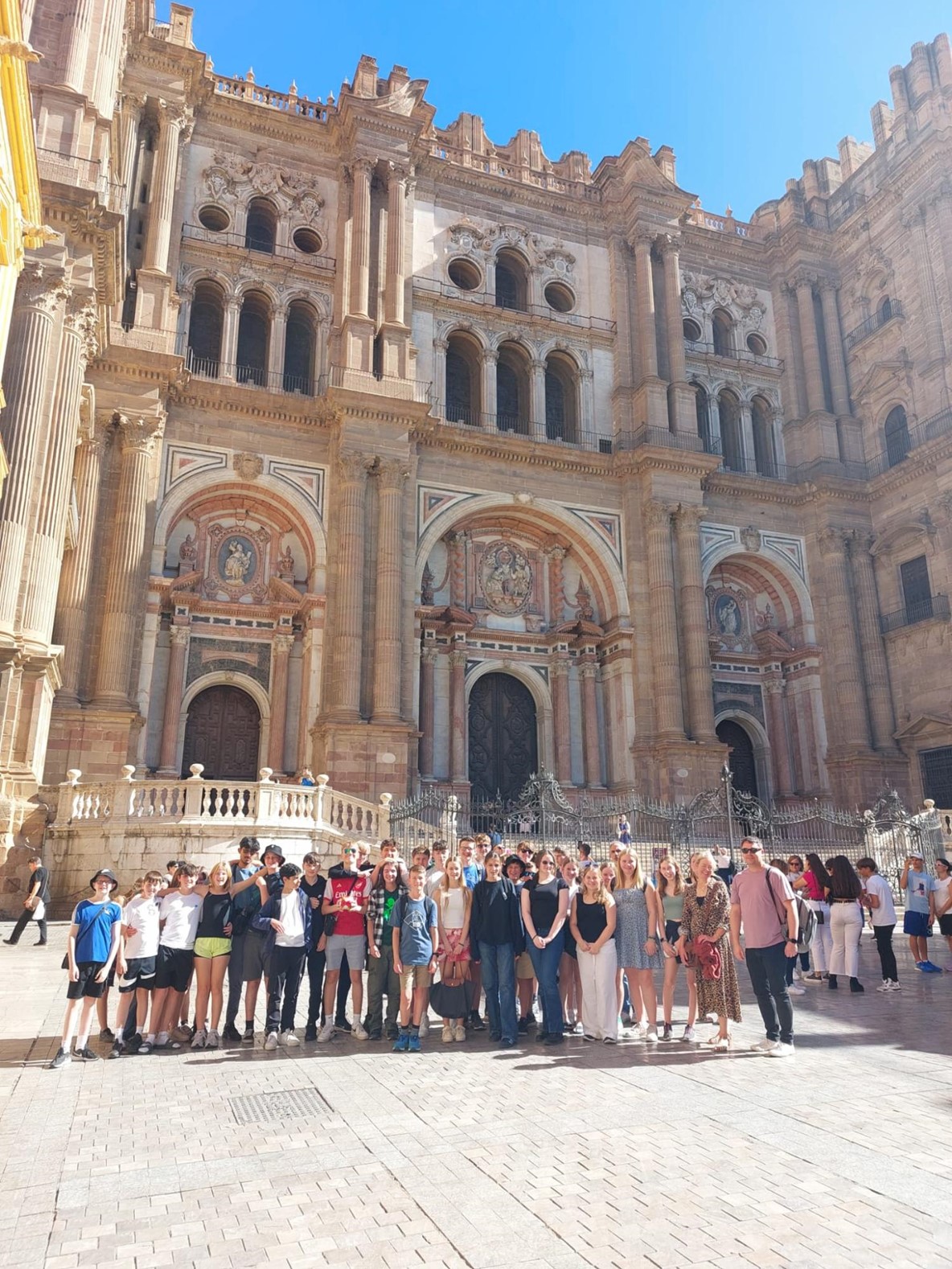
Visit to Malaga
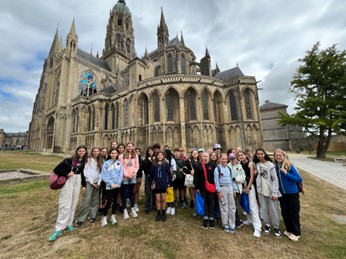
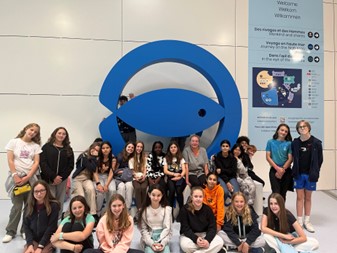
French Trip
